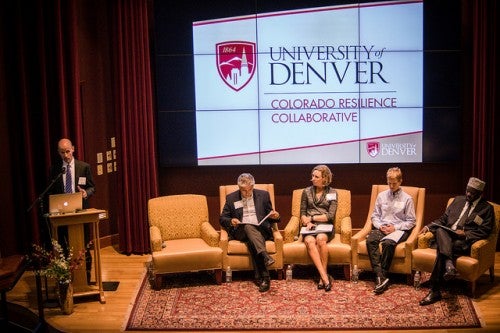New DU Initiative Addressing Identity-based Violence Due to Radicalization and Discrimination
Colorado Resilience Collaborative researching recruitment efforts by extremist groups
A new interdisciplinary initiative at the University of Denver is tackling an issue that is impacting cities, states and countries all over the world, including Colorado.
The Colorado Resilience Collaborative (CRC), which began as a concept in 2016, officially launched in October to address identity-based violence due to radicalization and discrimination based on race, ethnicity, nationality, faith and ideology.
“[The CRC] grew out of an identified need to provide services to those who are exposed to extremist groups touting violence as an answer to marginalization, misunderstanding and victimization,” says Rohini Gupta, co-director of CRC. “Colorado is a state that has been deeply affected by mass violence, the recruitment of vulnerable youth and young adults to join groups that advocate violence as a solution, and the presence of hate crimes that impact marginalized communities.”
The collaborative is funded by multiple sources, including the Colorado United States Attorney’s Office, the Department of Homeland Security and University of Denver’s Graduate School of Professional Psychology (GSPP). CRC is housed within GSPP’s International Disaster Psychology program and is part of the Trauma and Disaster Recovery Clinic.
At a time when extremists groups are looking for ways to broaden their international recruitment efforts, CRC, Gupta says, is focused on efforts to understand the vulnerabilities that might lead someone to be recruited by a group that promotes violence as a solution. Not only will the collaborative support survivors who have been targeted by these groups, it is promoting insight, healing and action at the individual, family, organizational and community levels.
“CRC will provide services that use a trauma-informed, culturally competent and inclusive approach. Our team will develop collaborative partnerships that support personal, social, cultural and political action,” Gupta says. “We work across three central areas: education, research and clinical services. Our three focus areas correlate with groups we’ve convened to ensure partnerships are incorporated into all the work we do.”
Clinically, CRC is providing services through the Trauma and Disaster Recovery Clinic — a training clinic that provides trauma-informed and culturally competent psychological services to those who have been impacted by adversity and trauma. The clinic focuses in the areas of immigrant and refugee mental health, compassion for helpers, and identity-based violence. Components of the clinic include consultation, psychotherapy, workshops and support with program valuation.
On the education front, CRC provides workshops for partners across the state. It already has partnered with the Colorado Collaborative Management program to meet with the Mesa County Sheriff’s Office and the Mesa County Commissioner’s Office, as well as representatives from Gunnison, Delta, Mesa and Montrose counties. In November, CRC presented at the Colorado State Department of Youth Services Conference and at the CARES network meeting, a coalition of refugee and immigrant service providers.
Annie Miller, co-director of CRC, says the organization’s research is primarily focused on understanding the grievances Coloradoan’s have and the extremist groups currently recruiting in Colorado.
“Our hope is to begin utilizing this research to build political and social avenues for action that would detract others from joining extremist groups,” Miller says. “Our research agenda is about better understanding how individuals are recruited by groups active in Colorado and what communities and individuals can do to decrease risk while increasing prevention efforts. We are looking at groups from across the ideological spectrum. This work is not about the idea — it is about reducing targeted violence.”
The need for such an organization comes at a time when political landscapes across many countries, including the U.S., have become more violent and deadly. Citing a recent government report, Politifact says that between Sept. 12, 2001, and Dec. 31, 2016, there were 85 deadly attacks in the United States by violent extremists. While most of those were carried out by far-right extremists, more people died from attacks connected with Islamic jihadist extremists.
Colorado is no stranger to violent extremist groups. In 2015, then FBI Director James Comey said during a news briefing that the state’s large military population and bases faced a security threat from the Islamic State and its U.S. followers. In 2014, three teenage girls from Colorado were tracked down in Germany on their way to join a radical group. Vail was targeted by Earth Liberation Front members in the 1970s, and prior to that the Ku Klux Klan actively recruited across the state in the late 1800s and early 1900s.
“Identity-based violence is an issue that impacts our communities and is exacerbated with the current domestic and international climate,” Gupta says. “Our hope is to provide insight, healing and action for partners, families and communities across Colorado.”
Through a socioecological approach, CRC is looking at how it can intervene at multiple levels, including:
- Supporting individuals, family members and peers impacted by identity-based violence
- Helping to strengthen an organization’s capacity to respond
- Helping build relationships across organizations and institutions that enable them to better collaborate and communicate with one another to address this issue
- Identifying recommendations that will inform policy
“There is a strong need to understand the psychological and social factors involved that lead someone to be vulnerable,” Miller says. “The Colorado Resilience Collaborative has an opportunity to help strengthen capacities and resilience at all levels in our community.”








